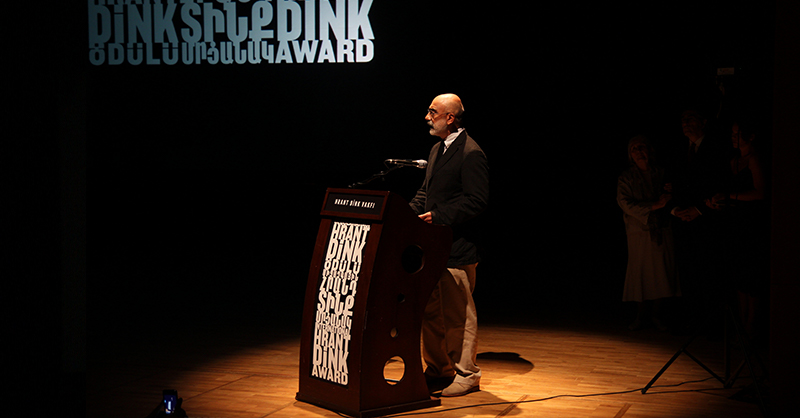
AHMET ALTAN, born in 1950, studied at various secondary and high schools, entered Middle East Technical University and graduated from the Economics Department of Istanbul University. At 24, he became a journalist, working in many positions, from reporter to editor-in-chief. As a columnist, he wrote in the weekly Nokta and the daily newspapers Hürriyet, Güneş, Milliyet and Yeni Yüzyıl.
His outspoken criticism of the system meant he was often tried and prosecuted and forced to leave his job; but he did not give up his struggle.
His first novel, ‘Four Seasons of Autumn’, published when he was 27, won the Grand Award of the Akademi Publishing House. His second novel ‘Trace on the Water’, 1985, was banned due to obscenity. The trial went on for two years. Some pages were adjudged to be obscene and the book’s confiscation and extermination was ordered. The book was re-published after the removal of these “nasty” passages. ‘Dangerous Tales’, 1996, became a best seller. ‘Like a Sword Wound’, 1998, won the Yunus Nadi Novel Prize. ‘Love in the Days of Rebellion’ was published in 2001, ‘To Cheat’ in 2002 and ‘The Longest Night’ in 2005.
In November 2007 he founded the newspaper Taraf with Alev Er. In an interview he explained the reason for founding Taraf as such: “If you take sides with honesty, then you can remain impartial in the face of events. What is impartiality? To remain faithful to the facts, to truth, when you report... That’s what we take sides with... We are determined to publish what other newspapers don’t or won’t publish.”
He is the current editor-in-chief of Taraf and writes the daily column ‘Hourglass’. He challenges and addresses “the army problem”, a main issue since the foundation of the Republic, questioning and criticizing military authority to facilitate the establishment of democracy. Despite ad-embargos, pressure and threats, he continues to struggle for his ideals and to set the agenda with courageous reporting. Focusing on democracy, he doesn’t hesitate to take risks and transforms the political landscape.
Everyone would accept a granted award with pride, yet today I am accepting this award with shame.
This award will remain in my life as a painful monument of impunity, as a reminder of an unaccounted sin.
The award I have been granted today bears the name of a good man.
The award I have been granted today bears the name of a person who was murdered.
Like everyone else living in this country, I bear the guilt and the sin as I failed to save Hrant Dink from death.
Like everyone else living in this country, I am as guilty and sinful as I failed to ensure Hrant Dink’s real perpetrators being captured.
He was murdered right before our eyes.
He did not fall victim to violence because of supporting violence, he did not fall victim to atrocity because of promoting atrocities, he did not fall victim to enmity because of fuelling enmity.
He was murdered because he supported peace and friendship.
He was murdered because he was a member of a race, a race which lost hundreds of thousands to brutal and unjust massacres; yet while without forgetting these killings and always keeping their pain inside, he did not believe that the account of those killings can ever called by new killings.
He was murdered because he wanted to build a bridge that stretches from a dark and bloody past to a future rewired with friendship.
Today, we are walking towards such a future by stepping on his body which stretches like a bridge of light in the emptiness that lie before us.
Perhaps Hrant Dink will be all alone in carrying seventy million people to a righteous future, seventy million who bears the burden of hundreds of thousands of innocent dead.
He has such an inherent power.
He was murdered for having such a power.
We do understand Hrant Dink’s importance better and better in a country where we still have massacres, murders, clashes, where we still hear the voices promoting violence and glorifying death.
He did not become one of those who try to take credit for himself out of atrocities and violence. Quite the contrary, he was chosen as a victim just because he wanted to give credit to peace out of his own self, his very existence, his soul and he took risks in this endeavour.
You are giving me an award bearing his name.
I am very grateful for your kindness, yet I do not believe that I deserve my name being written right next to his.
To become eligible for this award, I should have been able to protect him. To deserve this honour, I should have been able to make sure his murderers are found. If you allow me, I would like to take this award only as an entrustment.
Should one day in this country, a brave, honest and a dignified politician comes out to light who unveils the real perpetrators of Hrant Dink, who calls this brutal murder to an account, then I will be handing this entrustment over to him/her with great joy, right here, in front of this crowd. This person will be the real owner of this award.
Till that day arrives, I will be keeping this award as a symbol of pain I feel for a very good man and as a symbol of a hurt conscience scarred by the failure to save him from death.
I wish this day will eventually come and until then I would like to thank you very much for your generosity in handing this entrustment to a person who does not deserve it.
